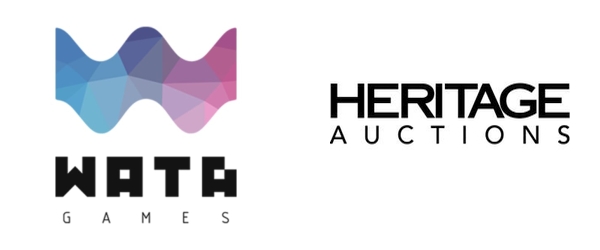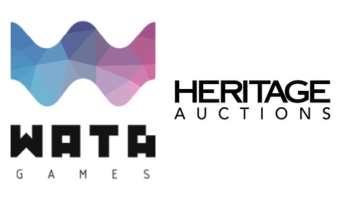
The market for retro games has exploded exponentially in the last few years, with the record for the price paid for a single game rising steadily from just over $30,000 in July 2017 to $114,000 in July 2020, $660,000 in April 2021, and $1,560,000 in July 2021. Earlier this month the record climbed again to $2,000,000.
It would be easy to chalk this phenomenon up to an aging base of collectors ready to spend their hard-earned dollars on something they could never obtain as children. After all, you saw the same thing with comic books and baseball cards in the 1980s and 1990s.
But something else might be going on here…
 Insert Quarter is a glimpse into gaming’s past, present, and future through an exploration of historical, retrospective, and contemporary reporting.
Insert Quarter is a glimpse into gaming’s past, present, and future through an exploration of historical, retrospective, and contemporary reporting.
Retro game collecting started to become headline-worthy in 2017 when a sealed (but not graded) copy of Super Mario Bros. was sold on eBay for $30,100.44. Writing for Kotaku, Chris Kohler looked at the sale with astonishment (he even doublechecked to make sure it wasn’t a joke bid):
You read that right: A mint-condition sealed copy of Super Mario Bros. from one of its earliest print runs sold at auction for $30,100.44 on eBay yesterday afternoon, and the seller confirmed to Kotaku that the buyer has paid up.
The seller, a longtime retro game dealer based in Pennsylvania called DKOldies, put the game up for a no-reserve auction starting at one penny.
Sealed Copy Of Super Mario Bros. Sells For $30,000
Graded games were still a niche corner of the market during this time, though Video Game Authority (VGA) had been operating as an evaluation and authentication service since 2008. Things changed considerably when Wata Games made a splashy entrance onto the scene in 2018 with a promotional push that included a partnership with Heritage Auctions and multiple appearances on History’s Pawn Stars.
Karl Jobst, a YouTuber who normally specializes in clips related to the speedrunning community, recently put together a video that touches on the very close relationship between Wata Games and Heritage Auctions, as well as the sketchy actions that founders of both companies took part in to pump up the value of sealed and graded video games:
Expanding on Jobst’s video, Seth Abramson used his Substack newsletter Proof to publish a lengthy report about other legally dubious maneuvers that executives from Wata Games and Heritage Auctions have participated in. He goes into more details about the Pawn Stars incident, and finds substantial proof of self-dealing and price manipulation by Richard Lecce, a “secret co-founder” of Wata Games:
The game, whose stunning value was sealed by its reception of a “9.4/A++” grade from grading house WATA, was purchased by a group of collectors including Jim Halperin, then a member of the WATA advisory board, and Richard Lecce, who has now been revealed, via digital evidence provided to Proof, as one of the three men who “founded” and “started” WATA just months before the historic sale of the WATA-graded game that Lecce purchased. In this new evidence—digital correspondence of a commercial character—Lecce identifies himself as having “founded” and “started” WATA, naming his co-founders and co-starters as current WATA president Deniz Kahn and the chief grader at WATA, Kenneth Thrower.
Lecce has never before publicly acknowledged his status as a co-founder of WATA, and this revelation has significant implications for the sealed video game market—which has lately become so lucrative that it’s now regularly reported upon by major-media outlets like the New York Times and, in this recent breathless article, CNN.
[…]
As a professional grader whose determinations and declarations on the box and seal condition of video games move hundreds of thousands of dollars in the nation’s hottest new collectibles market, Thrower’s claim to Ars Technica was not just highly irregular but misleading, however.
[…]
The story behind this bizarre sequence of events—a burgeoning scandal in one of the nation’s newest and now most lucrative “alternative asset class” markets—follows.
National Video Game Scandal Deepens As Purchaser of Historic Super Mario Bros. Game Is Revealed to Have Represented Himself As Co-Founder of Company That Graded It and Set Its Value
This is all just a complete mess, and there’s a possibility that a criminal investigation is forthcoming. That said, in a statement sent to multiple outlets, including Video Games Chronicle, both Wata Games and Heritage Auctions have denied these accusations and claim that everything they do is above board:
Wata has issued a statement to VGC in which it claims that the allegations made in Tuesday’s report are “baseless and defamatory”.
A spokesperson said: “Wata Games is the trusted leader in collectible video game grading and we’re honored to play a key role in this booming industry that we are incredibly passionate about. We’re humbled by the support of our thousands of customers who trust us to provide accurate and transparent grading.
“The claims in this video are completely baseless and defamatory and it is unfortunate that Mr. Jobst did not contact us to give us the opportunity to correct him.”
In a statement issued to VGC, Heritage Auctions denied it’s been involved in any illegal or unethical practices and claimed Jobst’s video contained “numerous misstatements”.
“Heritage Auctions wishes it had been given the opportunity to respond before the video’s publication, because there are numerous misstatements of fact and inaccurate conclusions contained within the piece,” a spokesperson told VGC.
“Heritage strongly refutes any allegation that it or its officers are involved in shill bidding, “market manipulation” or any similarly illegal or unethical practices. Heritage prides itself on our transparency and being a place built by and for collectors. With this in mind, we welcome the opportunity to discuss the video-game marketplace further, and would invite Mr. Jobst to our world headquarters in Dallas to tour our operations and speak further with leadership.”
Report alleges auction and grading ‘fraud’ is behind recent surge in retro game prices
Where does the market for sealed and graded games go from here? I’m not sure. But I don’t think this is the last we’ve heard about legally dubious shenanigans perpetrated by Wata Games and Heritage Auctions.

